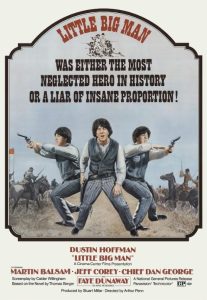
Arthur Penn’s rage-filled dissent is everything movies of the 1970s promised to be and usually were. Typically, it uses the past to comment on the present, citing the extermination of Native Americans in the 19th century as an indictment of U.S. policy in Southeast Asia during the 20th. In both cases, non-whites were butchered to further
the righteousness of Western capital; where the “guns, germs, and steel” (and a little Jesus, if you’re so inclined) of the mighty American Cock killed en masse in order to avoid a wave of crushing impotence.
Still, this is more than an immersion in blood and hellfire. Penn’s classic is, after all, more hilarious than disturbing; Jack Crabb’s (Dustin Hoffman) picaresque adventures are a
wry send-up of the Horatio Alger tale, where our obsession with, and endless pursuit of, re-invention makes authenticity and identity as illusory as history itself. And then are the native people themselves — the “Human Beings” — who are no doubt romanticized beyond description, but only so that we are provided a stark contrast with the cinematic savages that had come before. But these men and women, far from Kevin Costner glumness, are self-deprecating, silly (there’s a gay Native American character straight out of a John Waters film), and wise, but they’re always to be admired and lamented.
Above all, this is a grand, perhaps perfect, film. It takes chances, risks absurdity, and even today, remains pointed and relevant. And how else to describe a major Hollywood production that demolishes religious hypocrisy and American greed, challenges and exposes the lies of the Old West, and features choreographed violence as good as anything by Peckinpah? Oh yeah, brilliant.